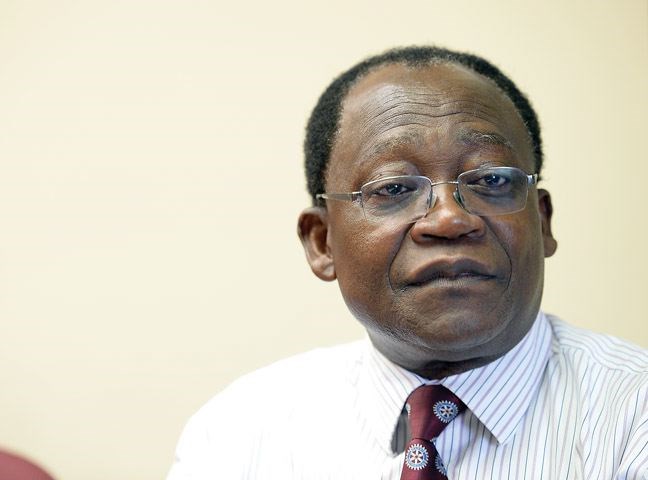Over the course of his four decades in medicine, Dr. William Osei has often repeated his refrain for those who seek advice:
"Look where you're going, don't you look where you are standing."
The idea is that everything can be improved upon and that any person can have a part in that process.
"My whole aim was to make a difference," said the recently retired Medical Health Officer for the Northern Interior, who's held that position at Northern Health since 2009. "That's my mantra: to make sure that people who are younger than us get it better, easier than us."
As Osei adjusts to a life outside the medical lens, the 68-year-old would do well to depart from his own advice for a moment, and simply look back.
In 2007 he became a fellow of the American College of Epidemiology. An active member of his community and church, this year the Nechako Rotary Club called him their Rotarian of the Year.
And in May, Osei was awarded the honorary life membership from the Canadian Public Health Association.
"I shed tears. First of all I was the first guy who looks like me to get (the honorary life membership) since this was instituted since 1942," said Ghana-born Osei, who emigrated to Canada in 1990 after working in Michigan, where he did a master's degree in epidemiology and public health. He's worked in as many as 50 countries, many during his time with the World Health Organization in the late 1980s and early 1990s.
"We have to start by identifying the humanity in everybody no matter what you look like, no matter your background, colour skin, hair or eyes. There is something in each one of us that is deserving of health and promotion."
It's that appeal to an ideal that Dr. Ronald Chapman considers one of Osei's distinguishing features.
"He's a very humane person," said Chapman, vice president of Medicine for Northern Health and a former Chief Medical Health Officer.
He called Osei conscientious, focussed on doing the right thing and innovative in his approach to partnerships in the medical community.
"He went out of his way to get to know people and that's a very good lesson for all of us working in the public health domain. You don't sit in your ivory tower, you actually get out there and you go and speak to people and meet them and find out how they're doing."
Those relationships are what a reflective Osei highlights, too.
"People have shared their personal stories with me. That has made me a better person," he said.
Osei earned his medical degree from the University of Ghana and got his start as a general practitioner in his home country.
One day a patient returned with Osei's prescription, forcing his way past the nurse.
"He came back about two hours later and threw it at my face," Osei recalled.
The pharmacy didn't have the medication. The man had waited a long time for the appointment with Osei, had lost out on income to support his family and it was something that could have been solved by a simple phone call.
"That was a turning point," said Osei, who turned to public health as a profession. "Why don't I affect how people get sick or how they stay healthy rather than waiting until they get sick and need medication?"
It's a proactive approach to health care that he's tried to bring in to each of his roles. For the northern interior, he instituted a regular debrief among staff in times of potential outbreak, empowering them to make decisions and fostering an environment where professionals share information so they knew what to do before Osei had to say anything.
"We don't waste time," said Osei.
"The public or the community is first priority," said Osei of communicable diseases. Twice he's had to resort to the legal system to invoke quarantine, both for women who were infected with tuberculosis in Prince George.
Under Osei's watch, he said the northern interior saw the length of outbreaks shorten, response time speed up and a reduction in the number of patients affected.
He also helped develop community health alert system (called Challies) in the north - an "innovative communication strategy" that sends alerts about any health advisories directly to communities.
He also has a project where he collects old medical equipment destined for the dump and sends them to underprivileged countries.
Many of Osei's proudest achievements were during his 14-year term as Saskatchewan's Epidemiologist. He recognized certain diseases don't have reporting requirements, like diabetes, epilepsy and heart disease.
"These people consume resources. These people need doctors, they need nurses, they need medication so unless we know the numbers we'll always run short of the resources that we should assemble to meet these cases."
So, he and two others launched a pilot study on diabetes surveillance in the Prairie provinces, which eventually led to the National Diabetes Surveillance System after he left his post in Regina. He also started the Saskatchewan Epidemiology Association almost 20 years ago.
"It makes you humble that what you were thinking about as a dream has now become something that is assisting the development and the future of other people," said Osei of his projects that are still at work in the north and at his past positions. "It's a very humbling situation."
Osei said he always sought new ways to involve others - whether his colleagues or community members - in health discussions. From a colouring book targeting HIV/Aids awareness among aboriginal youth to a book teaching coaches and to discuss health, Osei has tried to broaden Northern Health's reach.
"Everybody has a role in health. There is no exception."



